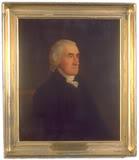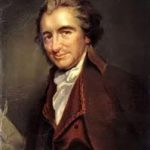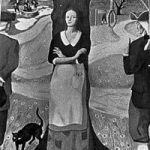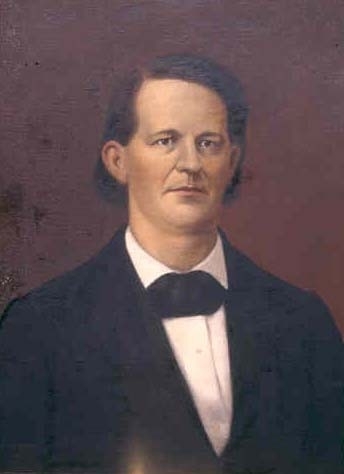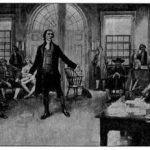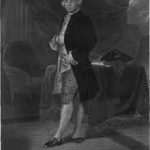Wife of Declaration of Independence Signer Robert Treat Paine
Robert Treat Paine
Edward Savage and John Coles, Jr., Artists
Sarah Cobb was born on May 15, 1744, in Taunton, Massachusetts, where her father, Captain Thomas Cobb, was a prominent citizen, magistrate, and member of the legislature. Her mother was Lydia Leonard, whose father and grandfather were both called Captain James Leonard, had been prominent in the early history of Bristol County. Her brother, General David Cobb, served all through the Revolution, three years of that time as an aide on the staff of George Washington. Sarah’s early life and education were similar to that of other daughters of well-to-do citizens of the commonwealth.
Robert Treat Paine was born in Boston on March 11, 1731, the son of Reverend Thomas Paine and Eunice Treat Paine. He could trace his ancestry back to a colonial governor, an acting president of Harvard, and a signer of the Mayflower Compact. His father, Thomas, was pastor of a church in Weymouth for several years, but because of impaired health, resigned and engaged in mercantile pursuits in Boston.
A bright, well-bred, popular youngster, Robert Treat Paine studied for seven years at the Latin School, then went on to Harvard College. While still a student at Harvard, his father’s business failed; upon graduation in 1749 at the age of eighteen, Paine had to teach in a country village – instead of running the family business as he had expected. He gave up teaching after one school term, and served as Chaplain of the military expedition to Crown Point in 1755.
Because of frail health, Paine set out to build up his strength by working on the sea. He spent some years as a merchant marine visiting the southern colonies, Spain, the Azores, and England. About this time, he decided to forsake the ministry for the law, in which he had become interested during his theological studies.
When he returned home in 1754, he began to study law in the office of Benjamin Pratt, later Chief Justice of the Colony of New York. Paine was admitted to the bar in 1757, two months after his twenty-sixth birthday. That same week his father died, passing on to his son the remains of a still-failing business. Paine first set up office in Portland, Maine (then part of Massachusetts), but in 1761 relocated to Taunton, Massachusetts, where he practiced law for many years.
In the 1760s, Paine was active in the resistance movement to the hated Stamp Act and Townshend Acts, and quickly became a patriot for the cause of independence. In 1768, he was a delegate to the provincial convention which was called to meet in Boston after the dissolution of the general court by Sir Francis Bernard, Royal Governor of Massachusetts.
Despite the governor’s efforts to prohibit such a meeting, the delegates remained for several days, discussing their grievances with the local government. This meeting served as an early warning that the Boston area colonists would act in their own best interests, even when their interests stood at odds with those of their leaders. At that time, Paine did not believe that separation from England would be necessary, but his participation in the meeting demonstrated his support of colonial rights.
On February 28, 1770, Robert Treat Paine married Sarah Cobb, who was already pregnant with their first child. They had eight children, four sons and four daughters. The oldest sons, Robert Treat, Thomas, and Charles were educated for the law, and Henry the youngest, for commercial business.
In 1770, the Townshend Acts passed by Great Britain imposed customs duties on British goods – tea, lead, glass, paints, and paper imported into the American colonies. British troops were sent to Boston to enforce payment of the duties. On March 5, 1770, a verbal exchange between a British soldier and a colonial apprentice named Edward Garrick took place on King Street. This argument heightened tensions between the colonists and the soldiers. Later that afternoon, Garrick returned to King Street with supporters, and the angry group directed all of their frustration at the soldiers.
Along with their insults, the colonists also hurled snowballs and oysters. One soldier retaliated by striking Garrick on the head with his musket. As passersby joined the scene to form a crowd nearly four hundred strong, nearby British soldiers arrived to address the very real possibility of a riot. Some witness accounts claim to have heard the word “Fire!” uttered by the British, but the claim is unsubstantiated. All that is known is that moments after shots were fired, eleven colonists had been injured and five men were killed in what became known as the Boston Massacre.
Boston hired Paine to prosecute the soldiers at their trial. John Adams led the defense team for the British soldiers despite his belief that war was inevitable. Though Paine was already a well-known attorney, he made a public name for himself during the course of the Boston Massacre Trial. Although he only convicted two of the eight soldiers, he became very popular among the patriots.
After the trial, Paine became even more involved in the colonial cause. A friend of both John Adams and John Hancock, Paine soon found himself enmeshed in the controversy with England over citizen rights. He served in the Massachusetts General Court from 1773 to 1774, and in the Provincial Congress from 1774 to 1775.
Robert Treat Paine was one of the first five Delegates sent by Massachusetts to the Continental Congress (1774-76), where he specialized in military and Indian affairs. The duties of the Congress at this time were to address the people of America, petition the King, state their grievances, assert their rights, and recommend the suspension of imports from Britain into the colonies. Paine served on the committees that formed the rules of debate, and later served as chairman of the committee charged with acquiring gunpowder for the Continental Army.
In 1775, Paine signed the Olive Branch Petition, the final appeal to the King of England, which was adopted by the Continental Congress in July 1775 in an attempt to avoid a full-blown war with England. The petition affirmed American loyalty to England and entreated the king to prevent further conflict. The petition was rejected by King George III, which proved to be a turning point for the colonists.
Many who had been on the fence about the prospect of war realized that the king would not negotiate and that without action there would be no change. Paine may not have been among the original supporters of war with England, but after the rejection of the Olive Branch Petition, he acknowledged its inevitability. In August 1775, the colonies were declared in rebellion.
Robert Treat Paine was an eloquent and articulate writer whose letters provide a deeper understanding of his feelings regarding the importance of the colonies fighting for independence. In a letter to his friend Joseph Palmer, Paine writes:
The day before yesterday the declaration of American independency was voted by twelve colonies agreeable to the sense of the constituents, and New York was silent, till their new convention (which sits next week) express their assent, of which we have some doubt. Thus the issue is joined; and it is our comfortable reflection, that if by struggling we can avoid the servile subjection which Britain demanded, we remain a free and happy people; but if, through the frowns of Providence, we sink in the struggle, we do but remain the wretched people we should have been without this declaration. Our hearts are full, our hands are full; may God, in whom we trust, support us.
In July 1776, Paine participated in the debates leading to the resolution for Independence, and signed the Declaration of Independence.
![]()
Robert Treat Paine Signature
On the Declaration of Independence
In December 1776, the British army were advancing through New Jersey towards Philadelphia. The following letter written by Mr. Paine gives an interesting account of the state of Congress at that time:
Our public affairs have been exceedingly agitated since I wrote you last. The loss of Fort Washington made way for that of Fort Lee; and the dissolution of our army happening at the same time, threw us into a most disagreeable situation. The interception of an express gave the enemy full assurance of what they must have had some knowledge of before, the state of our army; and they took the advantage of it. In two days after the possession of Fort Lee, on the 9th of November, where we lost much baggage, and the chief of our battering cannon, then marched to the Hackensack, and thence to Newark, driving General Washington before them, with his 3000 men thence to Elizabethtown.
General Washington supposed, from the best information he could get, that they were 10,000 strong; marching with a large body of horse in front, and a very large train of artillery. We began to be apprehensive they were intended for Philadelphia; and Congress sat all Sunday in determining proper measures on the occasion. I cannot describe to you the situation of this city. The prospect was really alarming. Monday, 9th; yesterday, General Washington crossed the Delaware, and the enemy arrived at Trenton on this side, thirty miles from this place; close quarters for Congress! It obliges us to move; we have resolved to go to Baltimore.
During the American Revolution, with their husbands and sons away, many women also assumed the burden of farm production. Some went into the fields themselves, plowing, or cutting and loading grain. Others supervised hired laborers or slaves, acquiring a taste for decision making in the process. “We have sowed our oats as you desired,” Sarah Cobb Paine wrote to her absent husband; “had I been master, I should have planted it to Corn.”
Robert Treat Paine was a member of Congress again in 1777 and 1778; during the intervals of the sessions he filled several important offices in the state of Massachusetts. In 1777, he was elected Attorney General of Massachusetts, a position he held until 1790. In this position, Paine made his most public statements concerning the politics and events of the day through charges to the grand jury. Between 1778 and 1780 he also played a prominent role in drafting the Massachusetts constitution.
In 1780, Paine moved from Taunton to Boston. Indicative of his lifelong interest in science, that same year he was one of the founders of the American Academy of Arts and Sciences. In religion, he broke away from Calvinism and embraced Unitarianism. Politically, he aligned himself with the Federalists.
In 1790, his old friend, now Governor John Hancock, appointed Paine an Associate Justice of the Massachusetts Superior Court, where he remained until 1804, when increasing deafness brought about his retirement. The honorary degree of Doctor of Laws was given to him by Harvard University in 1805. Thereafter, Paine enjoyed a peaceful retirement.
Robert Treat Paine died at his home in Boston on May 11, 1814, at the age of 83. He was buried in the Old Granary Burying Ground in Boston, Massachusetts, only a short distance from his birthplace.
Sarah Cobb Paine died on June 6, 1816, at the age of 72.
Robert Treat Paine is best remembered today as a signer of the Declaration of Independence, but his public career lasted over thirty years. During this time, he participated in some of the most important events of a tumultuous era – from financing the Revolution through the confiscation of Loyalist estates to the prosecution of rebels following Shays’ Rebellion. Although a staunch Federalist by temperament and practice, Paine generally managed to avoid the growing politicization of the times throughout his career.
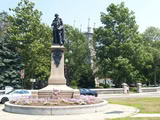
Robert Treat Paine Monument
Richard Brooks, Artist
On Church Green
Taunton, Massachusetts
Robert Treat Paine is featured in the 2008 miniseries, John Adams. In episode one, Paine prosecutes the British soldiers involved in the Boston Massacre. After losing in court, Paine and some colleagues visit Adams at home and attempt to enlist his support and use his credibility as an impartial party in taking a stand against the British. Paine admires Adams’ ability to be impartial even while he detests the British stationed in Boston.
SOURCES
Boston 1775
Sarah Cobb Paine
Robert Treat Paine
Olive Branch Petition
Signers of the Declaration
Wikipedia: Robert Treat Paine
Robert Treat Paine 1731 – 1814
Robert Treat Paine: Statesman
Robert Treat Paine: Massachusetts
Signer of the Declaration of Independence
Edward William Hanson, “”A sense of honor and duty”: Robert Treat Paine (1731-1814) of Massachusetts and the new nation” (January 1, 1992). Boston College Dissertations and Theses. Paper AAI9301672.
Descendants of the Signers of the Declaration of Independence
